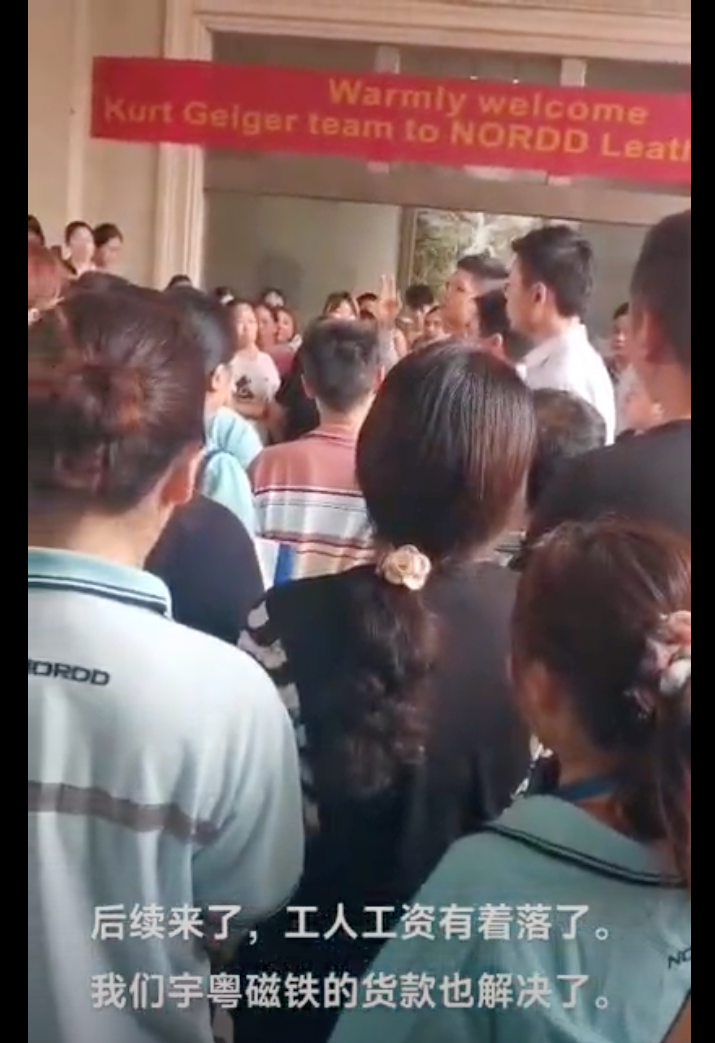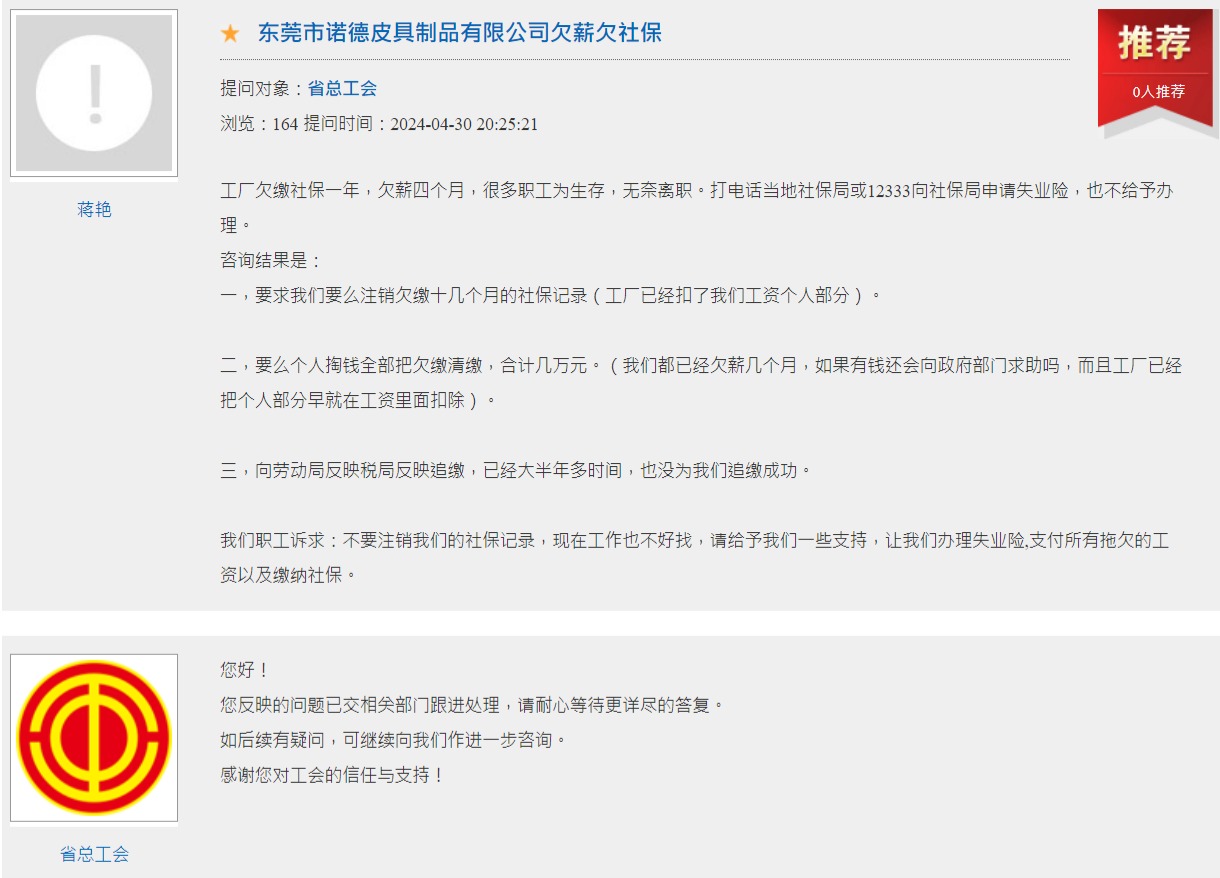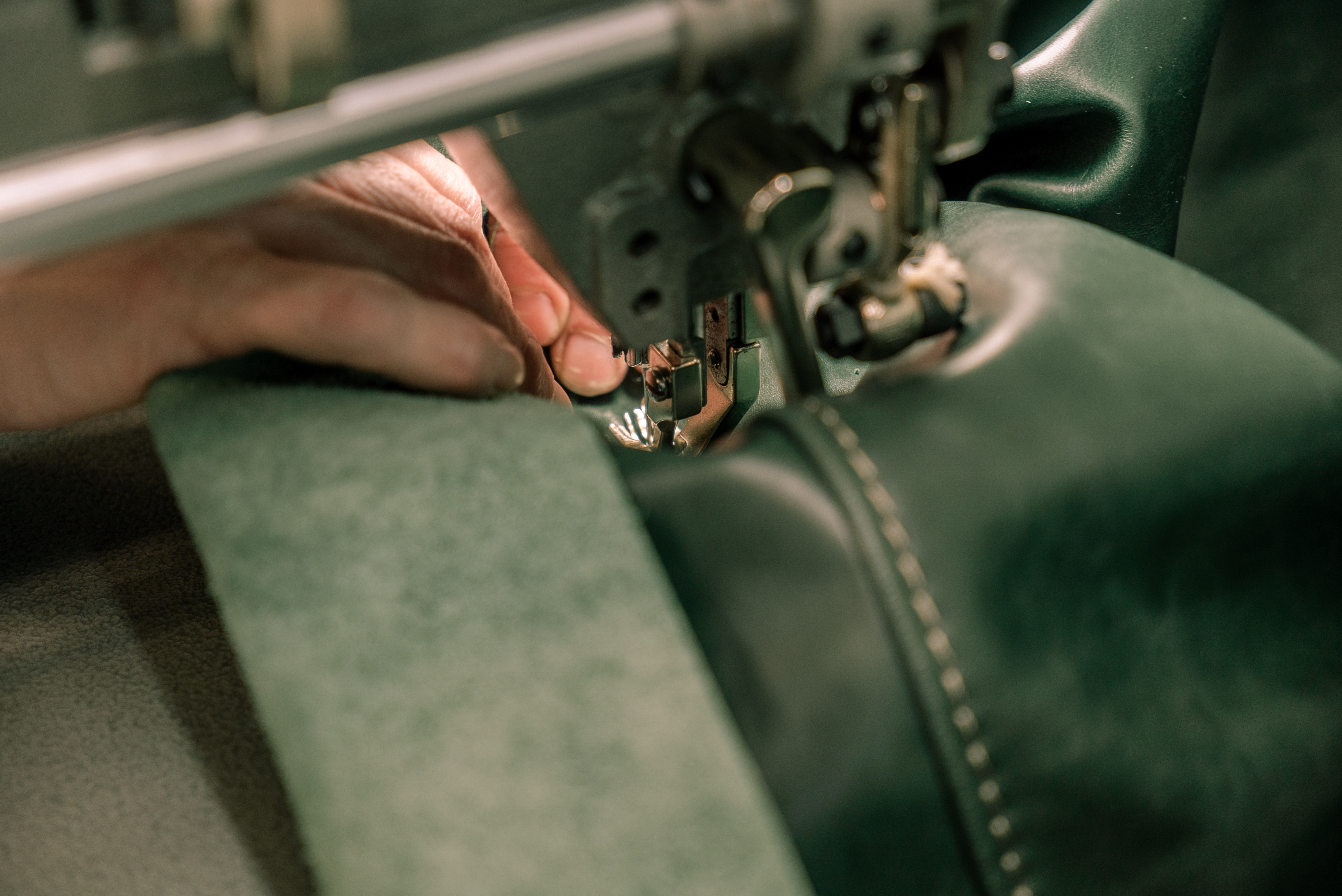- As Nordd Leather factory closed down suddenly, workers gathered to demand their overdue wages and social insurance fees.
- Unions at various levels failed to intervene, even when workers had made complaints months ago. Ultimately, the landlord and the Tax Bureau took care of the payment.
- Leather brands’ cost-cutting strategies possibly suppressed workers’ conditions. Recent Milan court rulings highlight that leather brands should monitor suppliers’ labour conditions; otherwise, they may face legal penalties.
On 8 May 2024, Nordd Leather factory (Nordd in the following), a 20-year-old company in Dongguan City, Guangdong province, closed down suddenly. Workers were not paid their wages and could not find Nordd's owner; hence, they gathered outside the factory with banners demanding their legal payback. A large red banner welcoming the visit of Kurt Geiner (a British clothing brand) remains at the factory gate, but the once-bustling production scene is no longer there. The factory owner was absent—workers said he had run away, and workers could only stay in the factory area, watching court officials come and go.
On 8 May 2024, a video on Douyin showed dozens of workers in Nordd uniforms gathered at the factory gate to complain about the closure and the unpaid January wages. The factory’s supplier, Yuyue Magnet, also complained that Nordd owed it tens of thousands of yuan. In the comment section, workers noted that Nordd had not given them severance pay and speculated that the boss had fled.
Two days later, another video on Douyin showed workers saying that the factory had closed and they were owed six months of wages in total. The footage showed personnel wearing uniforms with the label "Court" entering the Nordd factory while workers continued to sit around the office door, watching and waiting for a response.
On 13 May 2024, the supplier "Yuyue Magnet" posted another Douyin video stating that its payments were settled and workers' wage issues were resolved. It mentioned that the local labour bureau intervened, asking workers to cooperate in calculating their wages to ensure no money was owed.
"What’s the most important thing for you now? It is to cooperate. Why? Because the landlord just paid real money on behalf of the factory, and calculations need to be accurate. So during this time, everyone should cooperate with the landlord and our legal team. Your wages should not be short by a penny, and every item must be clear. Then, regarding further negotiations, our legal team will handle them with workers. You should first cooperate."
—a local labour bureau telling workers to calculate their owed wages

Photo: Workers gathering at the factory gate of Nordd
Photo source: Workers' Douyin
On 19 May 2024, a Nordd worker posted on Douyin that workers’ wages were still not paid, and the factory threatened to beat them. On that same day, the landlord--Dongguan Guangfa Handbag Co., Ltd.--issued a notice stating that the Nordd factory had ceased operations due to poor management. The landlord also said it would pay the overdue wages on behalf of Nordd. However, it remained unknown whether these “wages” that the landlord promised to advance to workers included economic compensation as stipulated by China's Labour Contract Law or not.
Nordd workers had long complained about unpaid wages and social insurance fees; the unions were aware but did little
According to records of the Qichacha enterprise database, Nordd Leather Products Co., Ltd. was established in 2010 as a joint venture invested by Nordd Leather (Hong Kong) Co., Ltd., with a registered capital of 19.31 million RMB. The company is located in Dani Village, Shatian Town, Dongguan City, and its legal representative is named Gou Yunfen. Its primary businesses include the sales and manufacturing of leather products, luggage, moulds, plastic products, and rubber products. The company had a staff size of 500-999 people.
China Labour Bulletin (CLB) investigated the actions/inactions of three levels of unions in this case, including the larger Guangdong provincial union, the local Shatian union, and the enterprise union.
Records show that as early as 30 April 2024, Nordd workers sought help from the Guangdong Provincial Federation of Trade Unions (the Guangdong union). They voiced their concerns through the union forum online, stating that Nordd factory had stopped paying social insurance fees for a year and had not paid wages for four months, forcing many workers to resign. The Guangdong union replied that the matter was submitted to relevant departments for follow-up. Unexpectedly, the Nordd factory closed suddenly a week later, leaving the workers unpaid and having to gather at the factory for justice.

Photo: Nordd workers seeking help on the online forum of the Guangdong union, and the union replied
After the workers ' strike, CLB called the Shatian Township Federation of Trade Unions (the Shatian union). CLB learnt that the Shatian union had received complaints from Nordd workers as early as February 2024. Still, they could not solve it, and workers went on strike when the factory closed. The union staff said that it was ultimately the landlord who paid 3 million dollars for workers’ wages, and the Tax Bureau is now in charge of the social insurance paybacks. What is the role of the trade union in this case then? Does Nordd have an enterprise trade union?
Records show that in 2017, Hu Chuanbin from the "Dongguan Nordd Leather Company Union Committee" was awarded "Advanced Worker in Union Work" on May Day, indicating that Nordd had a company union at least since 2017. CLB also found that Hu Chuanbin was not an ordinary employee, instead, he had several substantial titles—the legal representative, financial director, executive director, and manager of Dongguan Yang‘en Trading Co., Ltd (the Yang’en company). Hu held 49% of the shares of the Yang’en company, and Dongguan Nordd Leather Products Co., Ltd. also invested in the Yang’en company (owning 51% shares). This implies Hu Chuanbin was part of the Nordd's management.
Although the Nordd factory had a union with award-winning representatives, the union seemingly failed to either represent workers and negotiate with the company or report wage arrears to higher-level unions to protect workers.
Ultimately, the Nordd factory closed, and workers' complaints to the union yielded no results, forcing workers to take collective action to fight for their rights.
Global leather industry: companies cut costs, possibly suppressing worker wages
Nordd's promotional video shows it had supplied for brands including Coach, Burberry, Prada, Tumi, Kate Spade, Tory Burch, and Jack Rogers. The closure of this long-established leather factory might be related to these brands' recent cost-cutting operations.
The leather luxury goods industry has not been spared from the global economic downturn. Burberry, a British high-end clothing brand, announced a 40% profit drop in the recent year due to reduced consumer spending in Asia and the Americas. Another American company, Tapestry (owning Coach, Kate Spade, and Stuart Weitzman), reported flat revenue and profit for the third quarter this year compared to last year. To counteract declining revenue, multinational brands are actively cutting costs. Burberry projected a 25% decrease in sales in the first half of 2024 and planned strict cost controls. Tapestry stated that cost control allowed it to maintain stable operating expenses while expanding.
Due to multinational brands' cost-cutting strategies, China's leather industry exports dropped last year. The China Leather Association reported a 7.6% yearly decline in total leather product exports. The first four months of 2024 showed no improvement, with exports down 1.6% compared to last year. Leather factories in Guangdong faced operating difficulties last year, accelerating closures and resulting in workers’ protests. CLB's Strike Map recorded four leather factory wage disputes in the first five months of 2024, matching the total number in 2023 and a noticeable increase from one case in 2021.

Photo credit: kudryavtsev dmitriy/ Shutterstock
Milan court rulings warn brands to take responsibility for supply chain violations
Amid challenging economic times, leather product brands are increasingly responsible for monitoring illegal practices in their supply chains. Brands should prevent suppliers from cutting costs at workers' expense, as brands may face administrative investigations and legal penalties.
According to Reuters, the Milan court ruled against leather companies three times this year for failing to supervise their suppliers which violated workers’ rights. The latest June 2024 ruling involved Dior's subsidiary, which was found complicit in labour law violations. Dior's subsidiary had outsourced production to four leather workshops in Milan's outskirts, and the workshops had severely violated Italian labour laws. The court ordered Dior's subsidiary and the outsourced factories to bear legal responsibility together, with Dior's subsidiary placed under “judicial administration” for a year. The court highlighted Dior's failure to check the supplier's working conditions or technical capabilities by conducting regular audits.
The Milan court's decisions underline that leather brands must take responsibility for their supply chains–they must ensure that supplying factories do not violate laws to achieve cost savings. Both the supplying factories and the brand companies are liable if they fail to protect workers’ rights.
A recent Vogue article focused on how multinational brands can create better supply chains and interviewed CLB. CLB pointed out that factories fear losing orders, leading them to continuously reduce wage costs and even not pay wages in the absence of worker representation.
While cost-cutting is a commercial decision, brands have corporate social responsibility commitments and are subject to their home countries’ supply chain laws. When brands cut costs, they must ensure their decisions do not infringe on workers' rights. If their suppliers illegally closed factories, unlawfully laid off workers, or failed to pay social insurance, the brands should conduct due diligence, prevent illegal incidents, and remedy any resulting harm.
